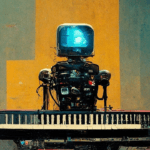Music has always been a powerful form of human expression, evolving alongside technological advancements. Today, artificial intelligence (AI) is making waves in the music industry, with programs capable of generating surprisingly realistic and complex compositions. But this innovation has sparked a heated debate – could AI music replace human artists altogether?
The Artist Rights Alliance and the Fight for Human Creativity

In 2023, a significant event occurred when over 200 prominent musicians, including Billie Eilish, Nicki Minaj, Katy Perry, and Pearl Jam, joined forces through the Artist Rights Alliance. They signed an open letter expressing concern about AI technology that could potentially replace or devalue the work of human artists without fair compensation.
Their primary worry is that AI-generated music could saturate the market, making it increasingly difficult for human musicians to stand out and earn a living.
The Rise of AI Music and its Potential Benefits
Proponents of AI music highlight its potential as a valuable tool for human creators. Here are some ways AI can contribute to the music industry:
- Inspiration and Experimentation: AI can generate new musical ideas and sonic landscapes, inspiring human composers and producers to push creative boundaries.
- Democratization of Music Creation: User-friendly AI tools could allow anyone, regardless of musical training, to experiment with creating music.
- New Artistic Frontiers: AI could open doors to entirely new forms of musical expression and collaboration between humans and machines.
Lorem ipsum dolor sit amet, consectetur adipiscing elit. Ut elit tellus, luctus nec ullamcorper mattis, pulvinar dapibus leo.
Ethical Considerations and the Human Touch in Music
While AI offers exciting possibilities, ethical considerations require careful attention:
- Data and Consent: When AI models are trained on existing music, questions arise about data ownership, consent, and fair compensation for the artists whose work is used.
- Devaluation of Creativity: There’s a concern that AI-generated music could be seen as a cheap alternative, potentially diminishing the value placed on human creativity.
- Job displacement in the Music Industry: As AI music technology continues to develop, some worry that human composers, producers, and even performers could be replaced by AI.
The Future of Music: A Collaboration Between Humans and Machines?
The Artist Rights Alliance doesn’t advocate for a complete ban on AI music. Their focus is on promoting responsible development and use of this technology.
The ideal scenario might involve a future where AI serves as a powerful tool to augment human creativity, allowing artists to explore new sonic territories and expand their artistic horizons.
The human element in music – the emotions, experiences, and stories woven into the compositions – will likely remain irreplaceable. AI music, if developed ethically and responsibly, could coexist with human artistry, enriching the musical landscape for generations to come.






